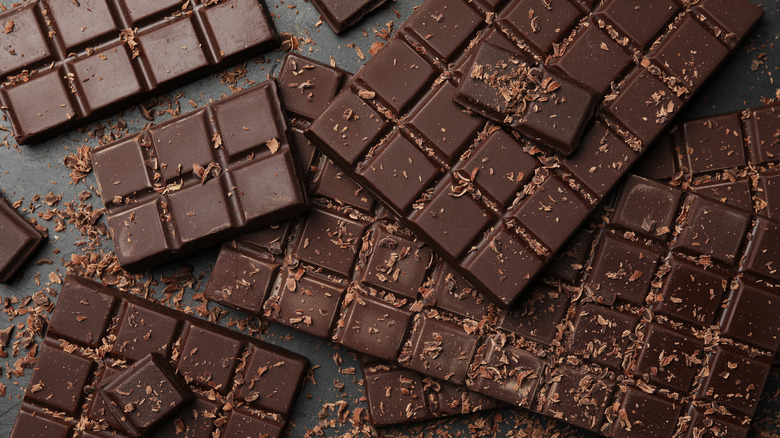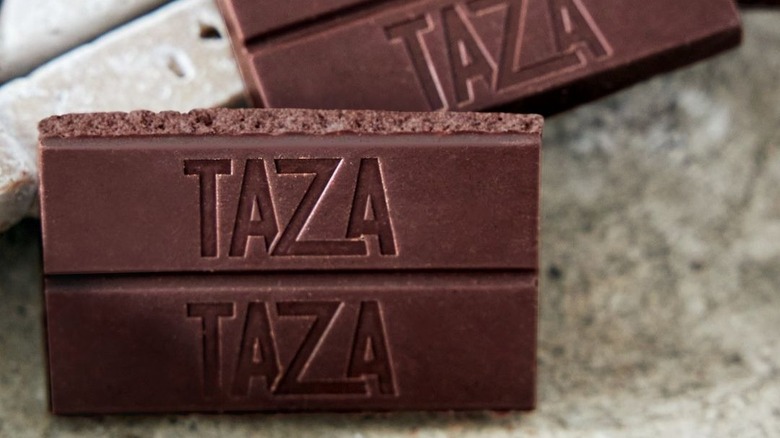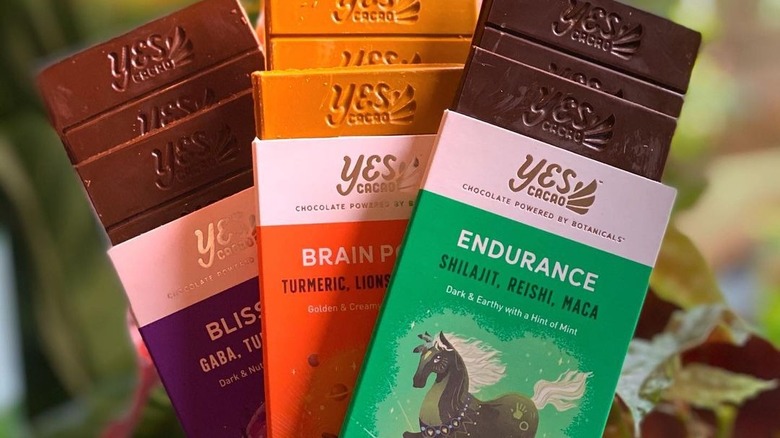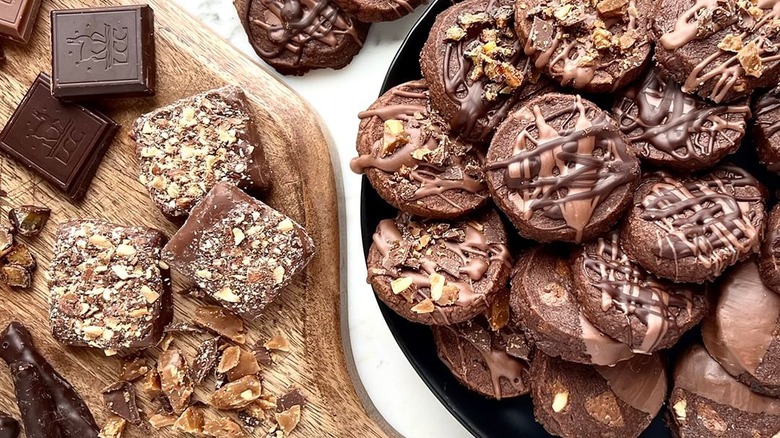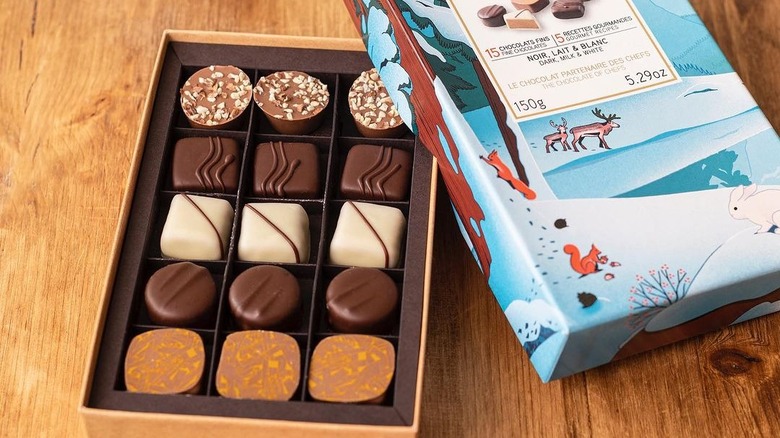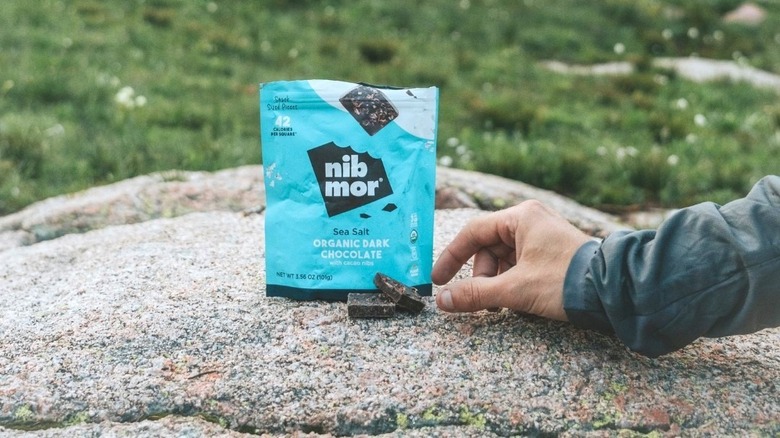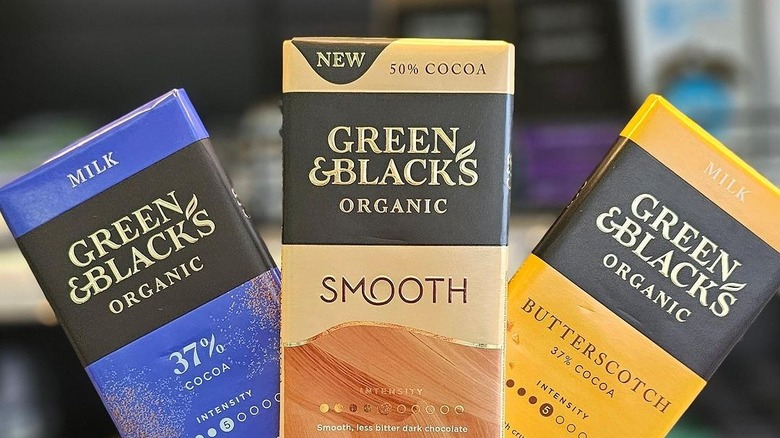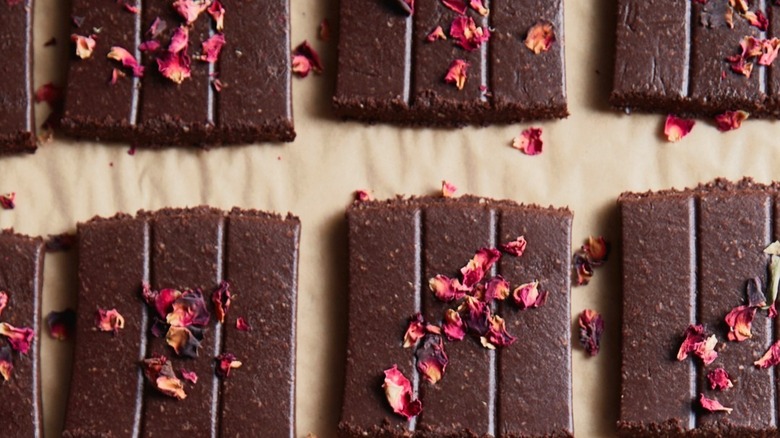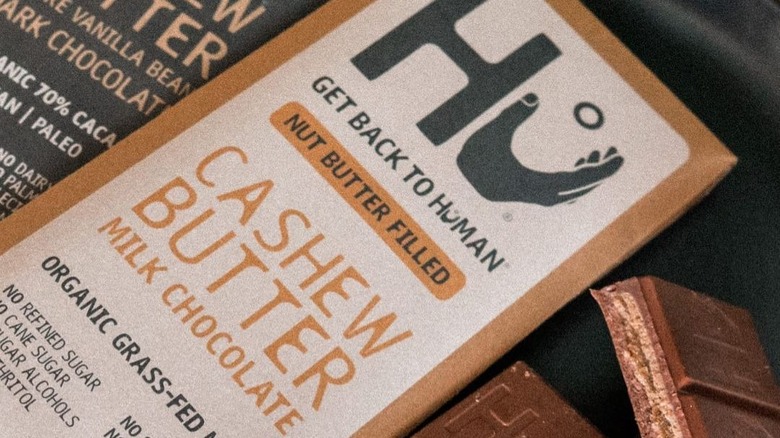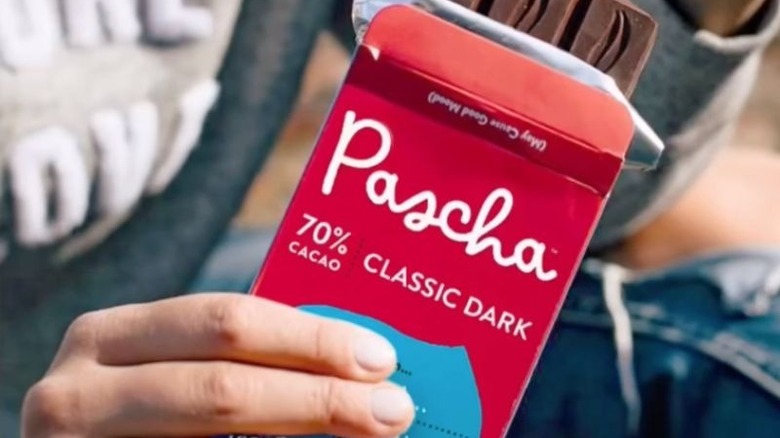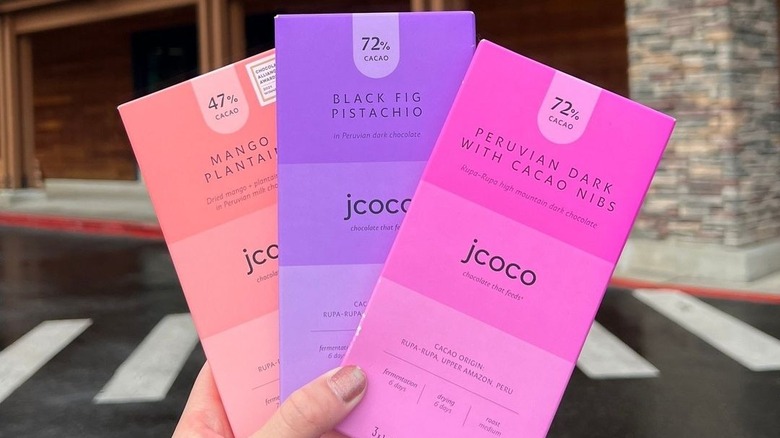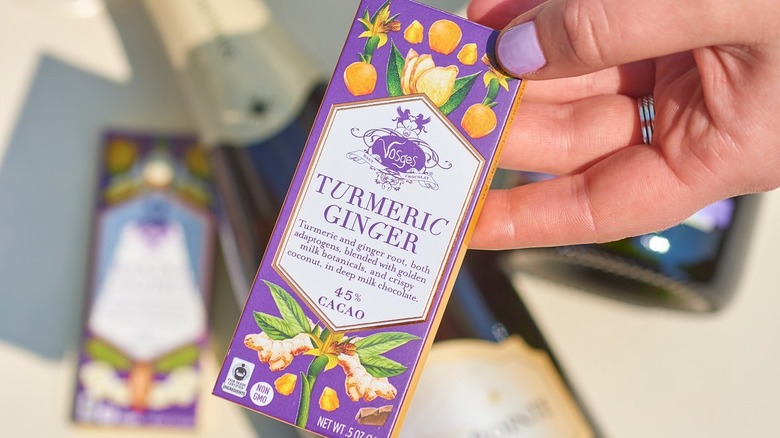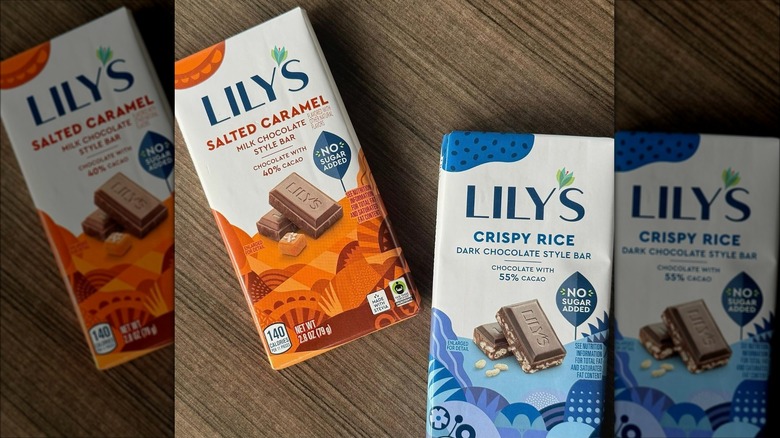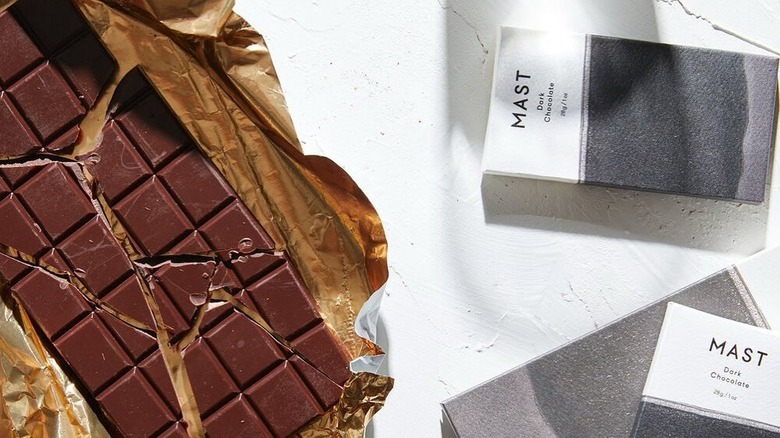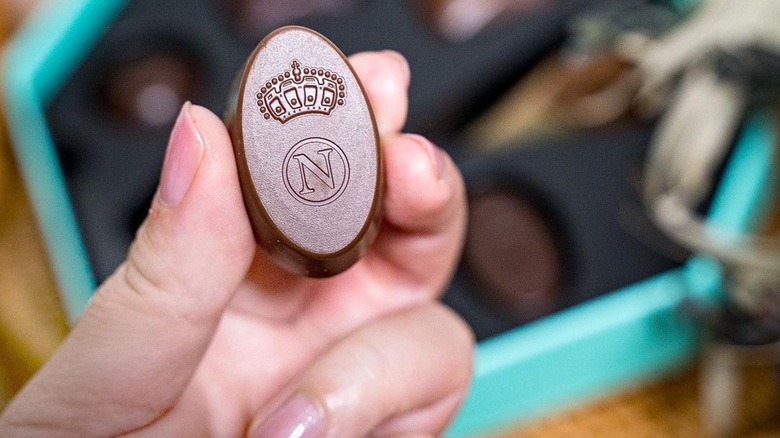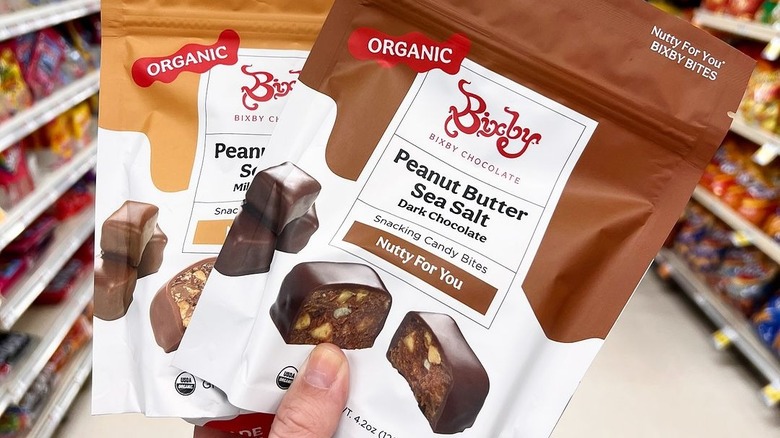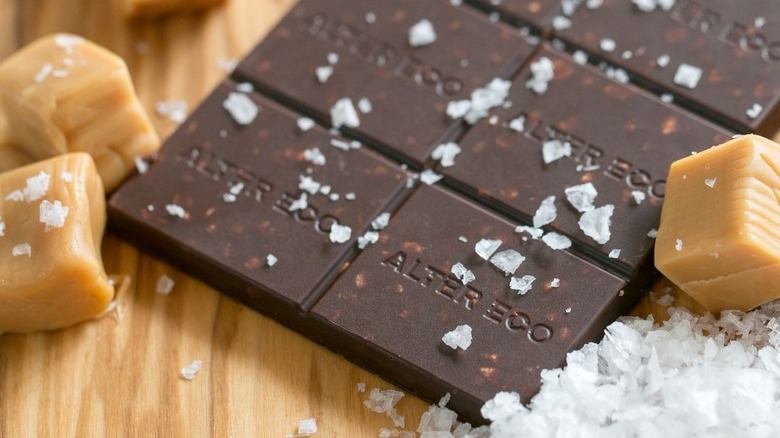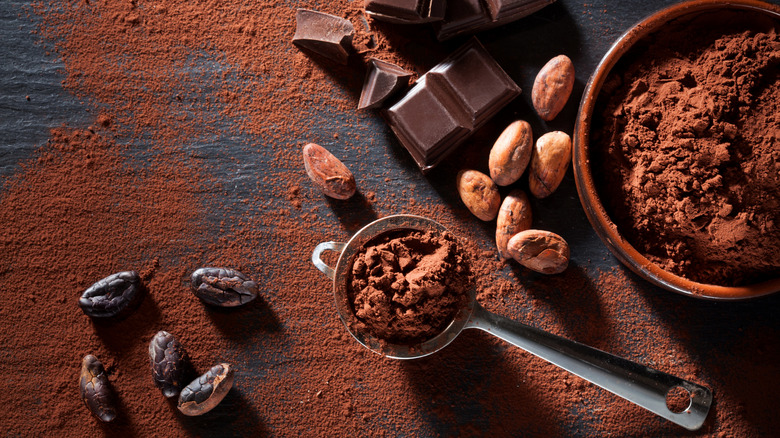16 Chocolate Brands With Highest Quality Ingredients
We may receive a commission on purchases made from links.
Some people go for wine, others choose pizza, but nothing brings pure, unadulterated joy on a rough day quite like chocolate. But not all chocolate bars are built equal. Tasty though they are, plenty of popular treats come with lengthy ingredient lists that feel more concerning once the sugar high ends.
Fortunately, it doesn't have to be that way. While the candy bars at the grocery store checkout typically fall into the former category, there are a growing number of brands utilizing high-quality ingredients. Typically, these will use a high percentage of cacao, real vanilla, and very little else, unlike a lot of the mainstream names that stuff bars with not-so-healthy additions such as high-fructose corn syrup, added sugar, and artificial colors (if you're wondering what we're talking about, just take a look at the back of a Reese's Milk Chocolate Peanut Butter Cups packet).
There's a reason why this kind of chocolate is so popular: it's delicious. However, if you're in the market for some next-level chocolate, we're pleased to tell you that there's no shortage of brands that taste just as good and use higher-quality ingredients. It should be noted, however, that 2022 Consumer Reports piece did indicate the presence of heavy metals in some brands on this list, so consider that with regards to your snacking habits.
1. Taza Chocolate
It was in Oaxaca that Alex Whitmore discovered the traditional Mexican technique of grinding cocoa with stone mills. Shortly after, Taza Chocolate was born. Made in Massachusetts, each bar receives minimal processing to help preserve the natural, complex flavors of organic cacao — something usually masked by a combo of sugar, milk, or additives.
The result is probably a little different than most chocolate you've had in the past. Taza Chocolate has a gritty, rustic texture, and its dark chocolate collection — which ranges from plain to fun flavors such as Lemon Cookie Crunch — is a delicate mix of both sweet and bitter. This is especially the case with its bars containing higher concentrations of cacao, which rely on very few other ingredients. Its 95% Wicked Dark collection, for example, is a simple mix of cacao beans and 2 grams of organic cane sugar. Nothing more, nothing less.
2. Yes Cacao
Tapping into the benefits of pure cacao and combining it with other nutritional ingredients, Yes Cacao is on a mission to turn chocolate into a health food. Its founder, Justin Polgar, has dubbed himself a real-life Willy Wonka, living out our dream of consuming half a pound of chocolate daily to perfect his Botanical Chocolate Bars.
Each has a different purpose, such as Endurance, Brain Power, and Bliss Out. These names aren't just conceptual. Brain Power, for example, contains Lion's Mane mushrooms, turmeric, and ginkgo, all of which are believed to have brain-boosting properties. Underneath these additions, you'll also find organic wild cacao and CleanCane, Yes Cacao's own-brand cane sugar grown in the Ecuadorian Andes, which uses a special technique to maintain its medicinal and mineral properties.
Behind the scientific jargon, you'll find that Yes Cacao is, most importantly, delicious. Brain Power is sweet and creamy, with a hint of spice that's almost autumnal. Those who prefer dark chocolate should opt for Bliss Out or Endurance, the latter of which has slight minty tones.
3. Lake Champlain Chocolates
This family-run, homegrown chocolate brand had its start in Vermont in 1983. Over 40 years later, its process remains the same: sourcing ethically sourced cocoa, fresh dairy, locally produced maple syrup, and honey straight from the hive to whip up top-tier chocolates. Quality has been the focus for Lake Champlain Chocolates from day one, with a strict policy against preservatives, extenders, or additives.
Of course, these are all just words if the chocolate doesn't taste any good. However, we're pleased to say that Lake Champlain Chocolates offers some of the most moreish snacks around. The brand has won multiple prizes at the Specialty Outstanding Food Innovation Awards with its lineup of bars, truffles, and chocolate-covered caramels. From its Peanut Butter Cups to its Five Star Bars — which were once dubbed "the ultimate chocolate bar" by Vogue — every product contains up to 80% Fairtrade cocoa (and is totally free of palm oil fillers). Good stuff.
4. Valrhona
Valrhona likes to compare chocolate to wine, scrutinizing cocoa like wine connoisseurs do grapes. The French confectioner — which differentiates itself by making pure cocoa butter chocolate — only purchases the highest-quality cocoa and is committed to working with ethical suppliers.
Sustainability isn't its only mission (although Valrhona does consider itself an industry leader). Taste-wise, its focus on high-quality, high-content cocoa means its chocolate has a smooth, not-too-sweet finish. While it boasts blends ranging from 35% to 100%, two of its most popular are the Caraibe 66% (which contains nuts and has a subtle woody aftertaste) and the Guanaja 70% (which manages to be both warm and bitter). Whichever you choose, ingredient lists are concise. Guanaja, for example, contains just five: cocoa butter, cocoa beans, sugar, sunflower lecithin, and vanilla. Admittedly, Valrhona is pretty expensive. On average, three bars will set you back $30. However, it remains a fan-favorite in baking circles despite the cost, which should tell you everything you need to know about its status in the industry.
5. Nib Mor
A high percentage of cacao is always a green flag when looking for quality chocolate. Everything produced by Nib Mor contains between 72% and 80% — an impressively strong number — and a lineup of carefully selected, simple ingredients.
These are crammed into small bites, with Nib Mor boasting two lines of chocolate: Snacking Chocolate and Snack-Size Bars. These are exclusively available in dark chocolate but come in fun flavors such as Blueberry, Peppermint, and Tart Cherry. Theoretically, these are perfect for a quick nibble, but you'll be hard-pressed to stop at the one (hence the name — see what they did there?) All flavorings are natural, with the likes of organic peppermint oiland vanilla extract, along with real blueberries and cherries helping each bar sing. You can currently only buy Nib Mor on Amazon, where all products are sold in bulk so you can stock up for future cravings.
6. Green & Black's
Green & Black's has always had an indulgent reputation — think the kind of chocolate you pick up for Mother's Day. All of its bars have four core components: chocolate liquor, cane sugar, cocoa butter, and Madagascan vanilla. Founded by Craig Sams — who opened Britain's first natural food shop in 1969 — and his wife Jo Fairley, these ingredients were always going to be mindfully selected. Sams came up with the idea of Green & Black's after stumbling upon organic cocoa while trekking around the world for peanuts. All of its chocolate is certified by the Fairtrade Foundation, with its 1994 Maya Gold being the first in the U.K. to receive a Fairtrade mark. Other ingredients are natural, too, with Green & Black's ethos being that "great taste comes from following nature's way."
Some of its bars use more cocoa than others. Inevitably, this means some are stronger in flavor. Fortunately, Green & Black's has developed a handy Intensity Scale, with each bar ranked from three (white chocolate) to nine (85% dark chocolate). If you want something sweet but not cloying, rich but not bitter, we recommend Organic Butterscotch, which ranks as a five on the Intensity Scale.
7. Honey Mama's
Honey Mama's doesn't create chocolate the way you imagine. The texture of its bars — which have to be kept in the refrigerator — has been compared to brownie batter or truffles. All are made with whole-food ingredients rich in nutrients, such as raw honey, coconut oil, coconut flour, and pecans, and are free of the likes of refined sugar, dairy, gluten, and soy.
As the name suggests, honey is the hero ingredient. Founder Christy Goldsby was determined to keep sugar content low, so has made the natural sweetness of honey — which she also chose for its healing properties — the powerhouse of every bar. Each contains 7 grams of sugar per serving, all from raw honey. To create its increasingly fun range of flavors (of which Cherry Hazelnut, Birthday Cake, and Pumpkin Spice are standouts), some bars also incorporate the likes of ginger root, pumpkin seeds, hazelnuts, dates, and vanilla. All are, of course, organic.
8. HU
Hu has a simple ethos: "No weird ingredients. Ever." That means chocolate bars without any refined sugar, palm oil, or emulsifiers, instead opting to keep the ingredients list short and efficient. Cacao and cocoa butter are the stars of the show, powering everything from plain chocolate to creative combos such as Cashew Butter + Raspberry and Almond Crunch + Coconut Flakes.
Each bar features unrefined coconut sugar, but even this is kept to a minimum. On average, Hu chocolate contains less than 8 grams — a third less than mainstream confectionery brands. This is great from a nutritional perspective, but that does mean the milk chocolate tastes slightly bitterer than Hershey's or Nestlé chocolate. The brand is also mindful of the dairy it uses in milk chocolate, sourcing only organic grass-fed milk. Dark chocolate is where Hu really shines, offering the widest variety of flavors (our favorite is the Salty Dark Chocolate, which has a solid five-star user rating).
9. Pascha
Many brands rely on sugar and fat to make tasty chocolate (and it works). Pascha set out to do the opposite. Somehow, it's formulated bars that are low in sugar but creamy, sweet, and satisfying enough not to feel like a punishment sent by your irate dentist.
Every serving of Pascha chocolate is organic and contains less than 8 grams of sugar. Some, like the 70% Cacao With Arabica Coffee, have zero. Part of the Pascha Promise is that its non-sugar-free bars use higher quality, unrefined sugar. It has equally high standards for cocoa. Each bar uses Criollo cacao beans grown in the foothills of the Andes, and is made "Bean to Bar At Source." That means Pascha can capitalize on the natural flavor offered by cacao and doesn't need to add extra sugar to bars with higher concentrations, such as 100% Cacao Organic Vegan Dark Chocolate.
White chocolate is often a pariah in the world of quality chocolate (namely because it's not technically chocolate, but let's not get into that right now). However, Pascha has even managed to come up with its own stripped-back recipe, which ditches cow's milk for rice milk and is 100% plant-based.
10. Jcoco
An artisanal sister brand to the Washington staple that is Seattle Chocolate, jcoco was launched as a way to indulge while simultaneously helping others. An impressive 10% of profits go to charity, with over 3.7 million servings donated to food banks such as Northwest Harvest.
Not only is it a charitable gem, but jcoco is equally mindful of how it gets its ingredients. The brand sources cacao from a local Peruvian chocolate maker and pays its farmers directly. It also ensures that other ingredients — including sunflower lecithin – are organic and just as ethically sourced. Several of its sophisticated flavors are award-winning, including Mango Plantain, Boharat Spice, and Single Varietal Contamana Cacao. You're in good hands whichever one you choose, but the Alaskan Smoked Sea Salt and Crisp Quinoa Sesame are the real standouts to us. If you're looking for the shortest, most refined ingredients list, your best choice is a bar from its dark chocolate selection.
11. Vosges Haut-Chocolate
If nothing makes you happier than a few squares of Hershey's Milk Chocolate, Vosges Haut-Chocolate isn't for you. The Chicago chocolatier has an aptitude for complicated flavors like Parmesan Walnut & Fig and Cheddar & Apple, which theoretically shouldn't work, but will soon make you rue the day you didn't know they existed.
The brand's founder, Katrina Markoff, traveled the world to find the best possible ingredients for her OTT creations. She has strict criteria for what makes the cut: anything fresh and natural is in, while artificial preservatives, hydrogenated fats and oils, and refined sugars are out. Markoff also infuses all of her Vosges chocolate with a 528hZ frequency to create a "transformational, healing, and miracle-manifesting experience."
Each bar has a few core ingredients in common, namely 45% to 72% cacao. More ambitious flavors also incorporate the likes of Japanese wasabi, ceremonial matcha, and premium unfiltered extra virgin olive oil. Don't knock the latter until you try it; just like the olive oil and ice cream fad, the Vosges Haut-Chocolate High-Phenolic Olive Oil and Dark Chocolate Vegan Truffles have proven to be real crowd-pleasers.
12. Lily's
Lily's was born out of a dilemma relatable to all chocoholics. Its founder, Cynthia Tice, decided to kick her sugar habit, but she also knew she couldn't go cold turkey on chocolate. So, in 2010, she created Lily's — a line of chocolate bars that rely on natural sweeteners such as stevia extract and a sugar alcohol named erythritol. Both don't affect blood sugar or insulin levels, which makes the brand a go-to for those skipping sugar both by necessity and choice.
Ditching refined sugar already makes Lily's ingredient list higher quality than most, but it's bolstered even further by unsweetened cocoa in percentages up to 92%. Other ingredients added to create flavors such as Blood Orange Extra Dark Chocolate, Birthday Cake White Chocolate, and Crispy Rice Dark Chocolate are free of GMOs. Many also feature chicory root, which is high in dissolvable fiber and great for gut health.
13. Mast
Simplicity is key for Mast. The chocolate brand revels in handcrafting small batches of classic flavors, each made with organic cacao from Tanzania and ingredients from local, organic farms in New York and New England (expect to read "organic" in front of pretty much every ingredient listed on Mast's products).
While its core collection is pretty straightforward, the exception is its Oat Milk Chocolate — a dairy-free combination so obvious in the golden age of oat milk that we're surprised every other chocolate brand hasn't scrambled to make their own yet. All it takes is oats, brown sugar, maple sugar, and vanilla. Its most organic flavors, however, reside within its collection produced in partnership with The Metropolitan Museum of Art. Wrapped in recreations of iconic paintings, each flavor is an art in and of itself. Tea Chocolate, Lavender Chocolate, and Almond Butter Chocolate are some of the highlights, all containing their fair share of, you guessed it, organic ingredients.
14. Neuhaus
Belgium is renowned for having the best chocolate in the world. The only way to do this properly is by having the best ingredients. The Neuhaus family has run the brand of the same name since 1857, when pharmacist Jean Neuhaus started wrapping his medicines in homemade chocolate to delight customers, and is credited with creating the first-ever Belgian praline using a similar method (just sans medicine).
High-quality milk, cream, and butter have been the priority for Neuhaus from day one. In 2017, they also ditched palm oils and now use only natural ingredients — including sustainably sourced cacao — for its white, milk, and dark chocolate alike. Unlike a lot of brands on this list, Neuhaus does use emulsifiers and boasts pretty long ingredient lists for its truffles or more elaborate chocolates. If you're looking to keep your chocolate as simple as possible, we recommend sticking to the likes of Milk Chocolate 35% or Intense Dark Chocolate 70%.
15. Bixby Chocolate
Based out of Maine, Bixby Chocolate is all about mouth-watering confectionery with a conscience. Its founder, Kate McAleer, is picky about the ingredients that go into her products, prioritizing those that are fairly and sustainably sourced. Her no-go list includes GMOs, gluten, corn syrup, additives, and preservatives, meaning she primarily relies on natural ingredients to work her magic.
Bixby's milk, dark, and white chocolate are all equally high quality, but as usual, it's the dark chocolate that wins ingredient-wise. The Dark Chocolate Salted Almond, for example, is made up of just four (organic cacao beans, cane sugar, almonds, and Maine sea salt) and is made Bean-to-Bar in Rockford, Maine. Even the more excessive flavors are free of unnecessary fillers, with the Crème Brûlée Bar — a multi-award-winning favorite that one passionate reviewer dubbed "more than just a chocolate bar, [but] a work of art" — only containing organic cacao beans, cane sugar, whole milk powder, and Maine sea salt. The definition of simple indulgence.
16. Alter Eco
Alter Eco is an organic brand that prides itself on creating "the cleanest, greenest chocolate." All ingredients are ethically sourced, with Alter Eco keen to support farmer-owned co-ops. While it does use raw cane sugar, it tries to keep numbers low. It's less forgiving of artificial flavors and preservatives, which can't be found in any of its products.
For the highest level of cocoa, go for the Deep Dark Super Blackout. This is dark chocolate with a 90% blend of Ecuadorian and Dominican cacao, respectively renowned for their malty and fruity flavors. Thanks to Madagascan vanilla and the Swiss conching method — which helps to evaporate both the most bitter substances and water vapor — it's surprisingly creamy. If you prefer milk chocolate, just as much care has gone into making these bars equally high quality. Alter Eco's milk chocolate only uses whole milk from grass-fed cows in the alpine valleys of Switzerland and still has a relatively high cacao percentage of 46%.
Methodology
We've tried our fair share of chocolate in our time, which came in useful when singling out the brands with high-quality ingredients. To get into the nitty-gritty of what constitutes "quality," we relied on ingredient lists provided by each brand to find those producing chocolate with high amounts of cocoa, organic and natural ingredients, minimal or zero unrefined sugars, and a lack of fillers, preservatives, and artificial additives. Ideally, this would apply to most — if not all — of a brand's products rather than just a small or limited-time collection.
